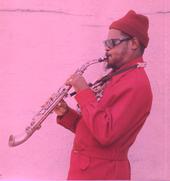...Recipe for Rahsaan:
— Start with the wind power of a bellows, the
ears of a dog, the visions of a shaman. Add musical instruments, pour in a
carnival barker's spiel, a soapbox pundit's fiercest diatribe, a sorcerer's
most powerful incantation. Add more instruments. Stir in the zeal of a
Trotskyite, the fortitude of a French Legionnaire, the wisdom of a Griot.
Add even the crazy, half-broken, rag-tag instruments that don't deserve to
be called instruments. Blend in a triple helping of musical talent.
Garnish with plenty of bright moments. Mix in a Molotov cocktail ready to
blow. Toss on stage and Run For Cover.
-Ted Gioia
Using his saxophone or his flutes, sometimes singing, humming, and delivering either mysterious or comical monologues, Kirk- succeeding and missing- sought a majesty that was an amalgamation of sources. His work reached back beyond the 20th century time line into the fields and the field hollers, the hymns, shouts, and spirituals, embraced the work songs and the portraits of gritty greasy Negro life found in the work of wanderers like Blind Lemon Jefferson and Leadbelly: and absorb the variations on the pagents that arose in the parades, street beats, picnics, and late-night erotic rituals in New Orleans.
His improvising was informed by lyric, sore-headed bears like Sidney Bechet and Ben Webster, the sophisticated harmony of Coleman Hawkins and Don Byas, Lester Young’s sailing, dreamy-eyed audacity, and the innovations brought to the saxophone by the plaintive, competitive, witty, naïve, jaded, and malcontent of Charlie Parker.
There was the feeling of the high-wire act in his circular breathing and something of the bitter loon in his sudden exclamations at the end of torrid passages where sorrow could so tangle up with joy that they were like two sweating, biting, wrestlers fused into a force made even more powerful by its ambiguity. Whimsy just as easily flowed from him, the willful play one used to observe in some after hours uptown joint when an old Negro dancer would take to the floor and toy with the repertoire of taps, slides, and turns that gave his art such casual aristocracy.
In Kirk’s tone there could be great tenderness or outrage at the strip-mining of the spirit by materialism. The universal bruises of the heart and the conclusions of affection that are perhaps our most idealistic forms of comfort were ever at the center of his sensibility, which is why he was able to say it all clearly in the monologue that introduces “Old Rugged Crossâ€.---
“ Now there’s the black cross, the green cross, the white cross, the double cross, the crisscross, and the lost cross. And the cross gets awful heavy at different times, but one is supposed to keep going on and carrying the cross on his shoulder, because you ain’t supposed to let no cross cross you up. You supposed to let a cross help you across. And if you let a cross help you get across, you won’t get crossed up but you’ll be on the cross ‘casue you done got across on the cross. So if you can remember this, you won’t get lost on the cross while you trying to get across. So we just here to let you know about it, I know that you knew already, ‘cause y’all the hippest people in the world, hip, black and white. But you still know that you got a cross you must deal with. So when it crosses you up, go on and deal with it, and leave it alone.†R. Roland Kirk(liner notes --Stanley Crouch)
